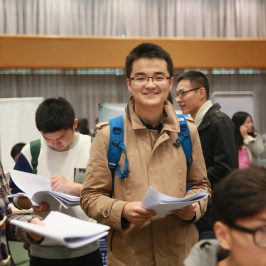
The MSc Economics and Finance programme combines a solid foundation in economic theory and applied econometrics with the study of finance.
Now, more than ever, the ability to use modern research tools to predict, analyse and respond to rapidly evolving economic, financial, social, and political trends is vital to the success and long-term viability of the modern business. The MSc Economics and Finance programme aims to provide students with a deeper understanding of the complex issues found within the world of financial decision-making, and the tools required to conduct rigorous research in applied economics and finance.
The MSc Economics and Finance programme blends economic theory, applied econometrics, and financial research, creating a solid foundation for students to enhance their scientific research skills.
IBSS students are able to take advantage of the school’s research centres and extensive industry links with companies in Suzhou and Shanghai for their internships, research and future careers. The school’s Financial Laboratory and Trading Platform provides real-world international data for learning and research, including data feeds from data streams such as Thomson Reuters. This programme features valuable EIKON system training by Thomson Reuters staff, allowing students to gain a Thompson Reuters EIKON training certificate. As a Quantitative Techniques for Economics and Management (QTEM) member school, IBSS is also able to provide students on this programme with additional learning opportunities at 25 top schools worldwide.
By the time you graduate from the MSc Economics and Finance programme, you will have:
The university offers a broad range of activities aiming to enrich master students’ theoretical and experiential learning and professional development. Trainings, workshops and seminars, covering varieties of themes and topics, both generic and subject-specific, are often offered at both university and school/department levels. Additionally, IBSS programmes offer discipline- specific supplementary modules which will aid to broaden your knowledge in that specific field and enhance your skills. These would include opportunities to work as a teaching assistant, research assistant, or intern at XJTLU. Depending on the programme, field trips and company visits will be organized, and invited talks will be given by the industrial experts and professionals. All these activities will not only support you in your programme study, but also develop your personal and professional skills and enhance your overall career and employability.

This programme is ideal for students looking for future roles such as portfolio manager, investment strategy analyst, director of research, market risk analyst, head of investor relations, senior economist and industrial economist. MSc Economics and Finance graduates have gone on to work in the financial sector, with central banks and other monetary financial institutions, multinational organisations, research institutions and the wider business sector. This programme is also an excellent choice for those looking to pursue a PhD and career in academia.

